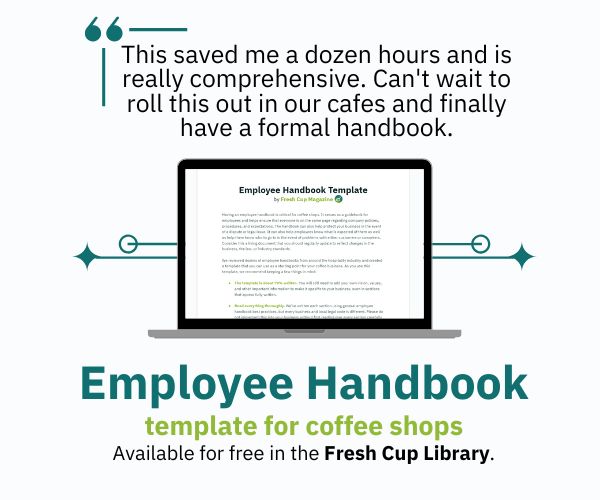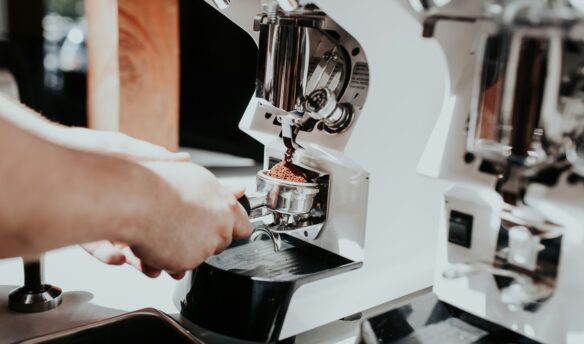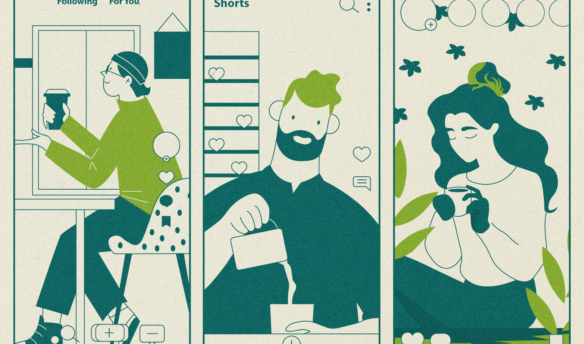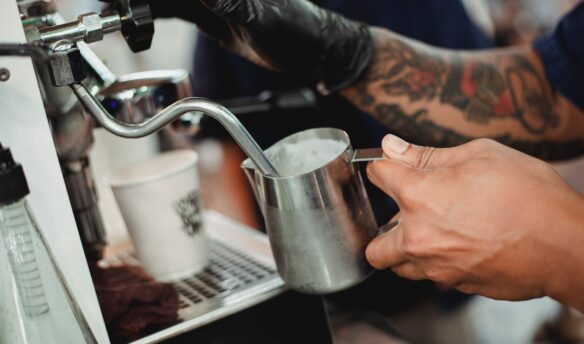[C]hurch coffee has a reputation somewhere below Denny’s coffee and somewhat above truck stop coffee. Though, to be fair, it really depends on the truck stop. For a long time, the reputation was well earned. But just as coffee has increased in quality everywhere else, it’s gotten better in churches. Instead of Folgers brewed and baked in giant percolator pots, some churches purchase micro-roaster coffee to serve in airpots. In Huntsville, Alabama, Whitesburg Baptist Church director of food services Mary Lou Herald has opened two cafés in the church. “You would be shocked at how many churches have a café or coffee service like this,” she says.
We don’t think about churches as a potential market, but they are. And you may never have thought of coffee as a ministry tool, but churches have. “The whole goal is to get people to socialize more,” says roaster Sandy Toomer. At most church services, “You stand up, sit down, stand up, sit down. The pastor comes in, ‘Blah, blah, blah.’ Then everyone stands up, shakes hands, and leaves.” Good coffee, he argues, can keep people in the church longer. And, for a roaster, the longer they stay in the church the more coffee they’ll drink.
“You would be shocked at how many churches have a café or coffee service like this.”
Toomer has sold coffee to churches for years through Toomer’s Coffee Roasters and more recently Coffee 4 Missions, a consultancy aimed at churches. Based in Auburn, Alabama, Toomer’s is awash in mega-churches. One client goes through 1,200 cups on Sundays, which doesn’t count the personal mugs.
At Whitesburg Baptist free, so-so coffee is provided in the adult Sunday school classes while the cafés, which serve Toomer’s, sell coffee and espresso drinks. Herald says the decision to serve better coffee was natural. “People have Keurigs at home; they have personal espresso machines,” she says. “They’re use to a higher grade of coffee.”
The same way many coffee companies want to work with clients who share their values, it’s normal for churches to lean towards roasters with a religious bent. Every church client testimonial on Toomer’s websites say Sandy’s faith was a big draw, as is the fact they donate twenty (yeah, twenty) percent of their profits to various ministries. That said, Herald called Toomer’s donations a bonus, not a requirement. The initial draw: they sent her free samples of coffee.
“This is what I always wanted: to spread the word of good coffee to a massive amount of people.”
In Vancouver, Washington, Phuong Tran and her Lava Java team recently took over the café in Crossroads Community Church. Neither a Christian nor a churchgoer, as a US Barista Champion Tran filled the church’s requirement of being a coffee professional. She rents the space from the church and operates just two days a week. The church has 6,000 members, with about 3,000 in the building on Sundays. “It makes sense to me work there,” Phoung says. “I looked at the numbers, I’m not going to get 3,000 people in seven days in downtown Portland.”
There are two services on Sundays, and in the hour break between them Phoung creates a cash-and-drip-only line. In an hour, two church volunteers serve six gallons of coffee. That frees her staff to sling espresso drinks from a simplified menu that includes just one size of drink.
She’s begun to see church customers show up at her café. “This is what I always wanted: to spread the word of good coffee to a massive amount of people,” she says.
Working with churches and other faith organizations can present particular challenges. The main being though they may look like it, they aren’t businesses. Churches, unlike other clients, often don’t have a single person making decisions. There are multiple pastors, plenty of staff, deacons, and boards to persuade. Toomer, when talking about consulting on church cafés, says it can be like herding cats. So even if you’ve persuaded the senior pastor to buy your coffee, the children’s minister might not want to give up her Veggie Tales video budget to do it.
If your community sees a lull in café traffic on Sunday mornings, it might not be because the coffee drinkers aren’t sipping brews. They may just be sipping something low-grade, praying for a day of better beans.
—Cory Eldridge is Fresh Cup’s editor.















